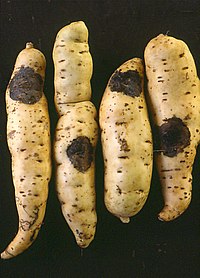
Photo from wikipedia
The inhibitive effects of chitosan on black rot disease caused by Ceratocystis fimbriata in sweet potato tuber root (TR) were evaluated. The results demonstrated that chitosan effectively inhibited the mycelial… Click to show full abstract
The inhibitive effects of chitosan on black rot disease caused by Ceratocystis fimbriata in sweet potato tuber root (TR) were evaluated. The results demonstrated that chitosan effectively inhibited the mycelial growth and spore germination of C. fimbriata and directly led to the cell necrosis. Chitosan altered the chitin deposition and influenced the fatty acid composition of C. fimbriata. The application of chitosan effectively controlled the C. fimbriata development in sweet potato TRs 17 days of storage 25 °C. Phenylalanine ammonia lyase (PAL) and superoxide dismutase (SOD) activity were clearly enhanced by the chitosan treatment, while the malondialdehyde (MDA) production was not increased. These findings suggest that chitosan effectively controlled the infection of C. fimbriata in sweet potato TRs owing to its antifungal and eliciting properties, which induced some defense responses during storage.
Journal Title: Food chemistry
Year Published: 2018
Link to full text (if available)
Share on Social Media: Sign Up to like & get
recommendations!